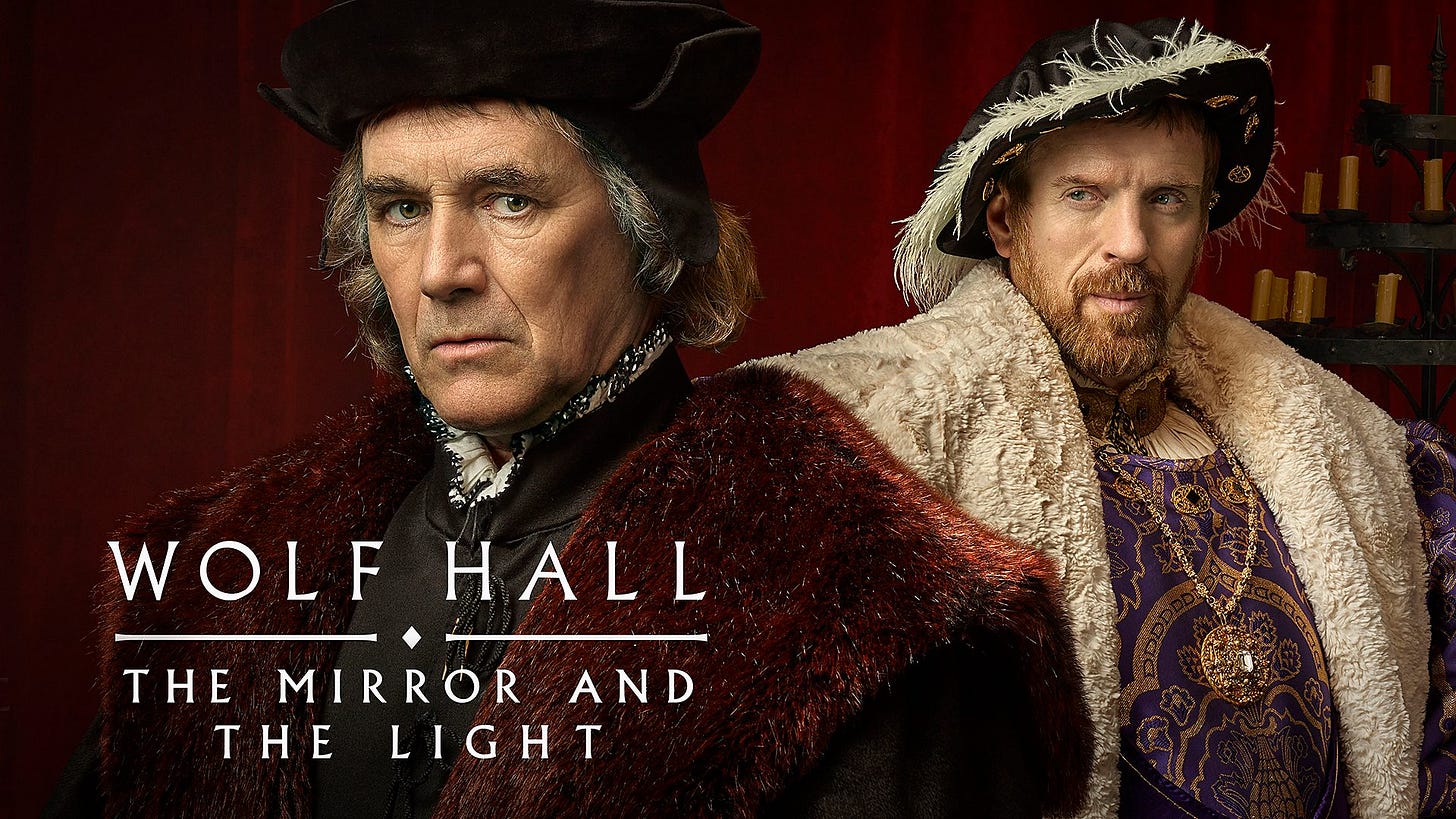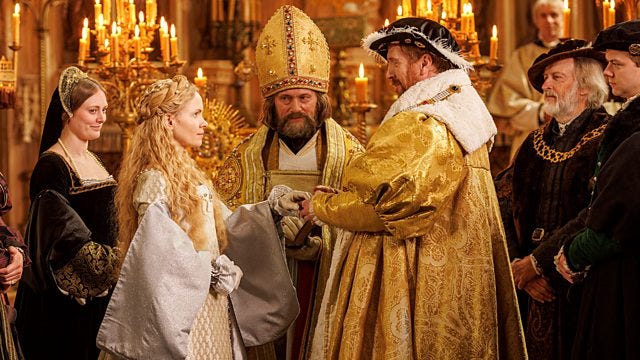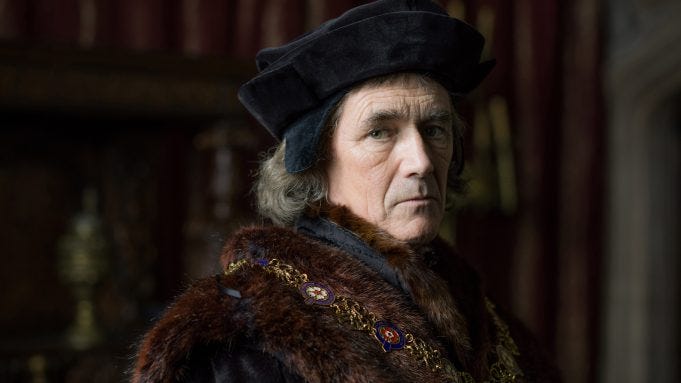Wolf Hall: The Mirror and the Light Review
What's a medieval historian doing at a Tudor premier anyway?
After ten years of waiting, we can finally get the marchpane in, pour a glass of malmsey wine, and consider codpieces in an entirely healthy way once more.
The adaptation of Hilary Mantel’s Wolf Hall: The Mirror and the Light begins on BBC1 at 9pm on Sunday 10 November. I was delighted to be invited to the premier of the first episode, followed by a Q&A with cast members and other production team members. I don’t quite know what a medieval historian is doing being invited to the Tudor television moment of the year, but I wasn’t going to say no!
This much-anticipated conclusion picks up in the instant the 2015 series ended. Anne Boleyn is led trembling to her execution, distractedly looking up to the windows above. When Cromwell is asked why she does this, he replies in his dead pan, detached way ‘Because she believes there is still hope.’ Spoiler alert. There is none, as Anne swiftly discovers. Henry, whom she looked to for salvation, is busy getting ready to marry someone else.
The fact that the cast is ten years older cannot be ignored, yet given Cromwell’s career spans a decade, it doesn’t feel out of step either. In fact, the swing of the sword that ends Anne Boleyn’s life is a good place to make the step. There is a powerful sense that in that instance, Cromwell is a changed man, one who now wears the weight of his years more heavily. The show continues to look incredible. With Dr Owen Emerson amongst the historical advisors, I would have expected nothing less. The show is filmed entirely on location at stunning manor houses, the costumes supporting the sense of being whicked back five centuries into the white heat of a kingdom lurching from one crisis to another.
The first series of Wolf Hall encompassed the first two of Mantel’s masterpieces, Wolf Hall and Bring Up The Bodies. The six episodes of this series will cover Mantel’s final instalment, sharing it’s name. Director Peter Kominsky lamented that Dame Hilary was no longer with us to share the release of the series, but reflected on the central role she had played in its creation. He explained that Mantel was sending the manuscript for The Mirror and the Light in hundred pages batches as she was writing. Kominsky also revealed what Mantel’s explanation of the title, and it makes perfect sense after watching the first episode.
Henry VIII, played by Damian Lewis, is as menacing as ever. His control over those around him appears so complete he hardly needs to lose his temper any more. It’s like watching a parent threatening to count to five. Neither parent nor child knows what will happen if the number is reached. It works because the child doesn’t want to risk finding out. When one of Henry’s oldest friends questions his treatment of his oldest daughter, now deprived of her royal title and known as Lady Mary, Cromwell bundles him from the room. The sense that he has just saved the man’s life is palpable.
The first episode sees the Pole family, Yorkist cousins of Henry VIII, trying to advance their cause, and that of the Catholic Mary. Reginald Pole, who is in Rome, his education paid for by Henry, The king has asked for an opinion about his break with Rome. When it comes, it is not just a letter, but a book. Pole’s work, Defence of the Unity of the Church, enraged Henry, and we are shown plainly that what causes Henry annoyance causes Cromwell work.
Amidst juggling the demands of the fickle, short-tempered king, Cromwell is clearly working to heal the breach between Henry and Mary. Cromwell’s fondness for the young lady is plain, and he carefully arranges the pieces on the chess board he always seems to see in his mind to ensure Mary’s security is Henry’s victory. There is a revelation as to why Cromwell works so hard to see Lady Mary safe. The question that remains to be answered as the story unfolds is why Cromwell choses to expose the reason when he does, to whom he does.
There are some welcome returning cast members, who continue to shine. Thomas Brodie-Sangster’s Rafe Sadler continues as Cromwell’s protégé-come-mole. Sitting two rows behind him at the premiere with my daughter also very nearly made me seem cool, because she’s a big Maze Runner fan. Jonathan Pierce reprises his role as (the ghost of) Cardinal Wolsey. The sad passing of Bernard Hill deprives us of the return of his Duke of Norfolk, but Timothy Spall steps into the role perfectly. Harry Melling takes up the part of Thomas ‘Call-Me-Risley’ Wriothesley with aplomb.
Mark Rylance is utterly spellbinding as Mantel’s Thomas Cromwell. The ten years that have passed since the first series seem to suit this stage of Cromwell’s career. I was struck by the end of the first episode by how haunted Cromwell seems. The things he has done to get where is is weigh heavily upon his soul. The things he must continue to do will, he knows, only add to that burden.
Ten years ago we watched him crash into the establishment from the outside and clamber to its pinnacle. As The Mirror and the Light begins, Cromwell is the establishment, and knowing that just means he has one more thing to be wary of. He has risen high. If he were to fall, it would be a long, al most certainly fatal, drop. Rylance silently conveys all of this complexity, risk, political positioning, and fragility of power. To watch Mantel’s Cromwell is to see a genius at work. To witness Rylance’s portrayal is to be in the presence of a true master of his craft.
Director Peter Kominsky explained during the Q&A that Hilary Mantel had told him what the title The Mirror and the Light meant to her, though she conceded that once written, it can mean whatever the reader draws from it. Mantel explained that the mirror represents memory, and that the light is Henry, a light which Cromwell is simultaneously drawn to, and repulsed by.
That fit with my sense of Cromwell as haunted. The visits of Cardinal Wolsey reinforce that – I mean, he is literally haunted by a man who had been where he is until it cost him his life. The closer Cromwell gets to the light, the more he can see in the mirror, the more the memory of what he has done is pulled into clear focus. Recoiling blinds him, a dangerous feeling for a man in his position.
What does Cromwell want? Revenge for Cardinal Wolsey? For the pain and death he has been forced to cause? A way to avoid the fall that seems inevitable after such a rise? To create a legacy before it can catch him? We have six episodes of beautiful television in which to find out.








Can’t wait
Really looking forward to seeing this! Great review, thank you.